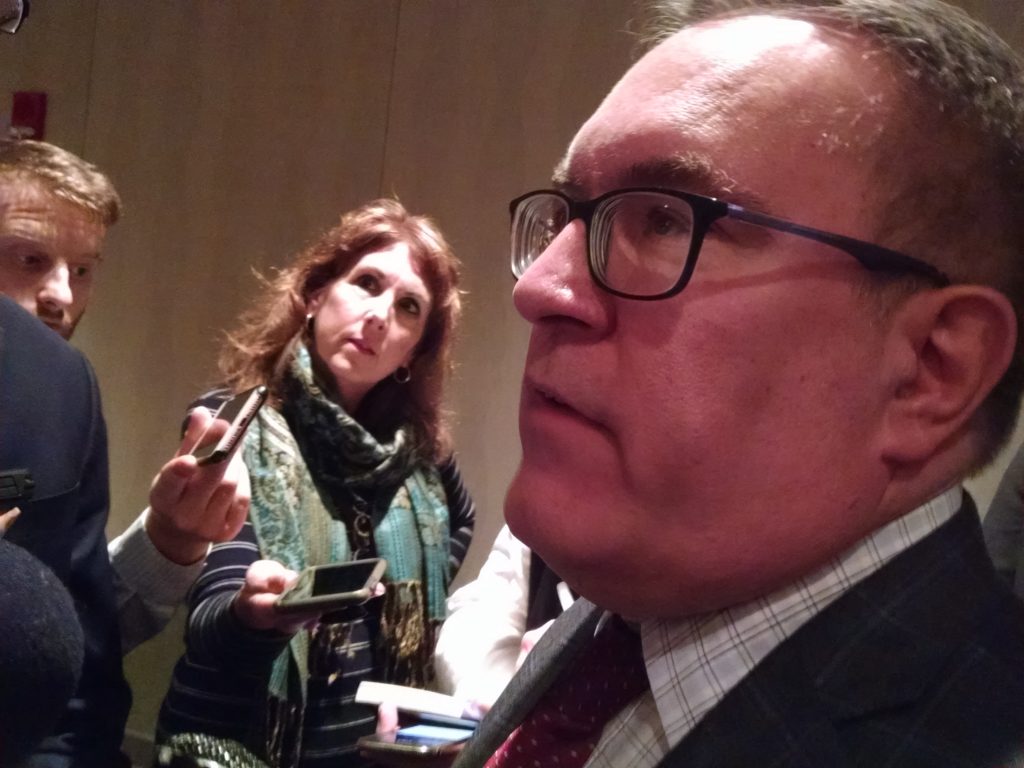EPA Chief Backs Cutting Emission Standards; Protecting Great Lakes
The head of the U.S. EPA says easing restrictions on fuel emissions will make roads safer and help the working-class buy more vehicles. And he says President Trump now backs a Great Lakes restoration program after years of trying to cut its funding.

The head of the Environmental Protection Agency Andrew Wheeler told business leaders at the Detroit Economic Club that automakers would have to make half of their fleet electric vehicles to meet stringent emissions regulations set by the Obama Administration — but that could hurt working-class Americans.
Wheeler said automakers will have to raise the price of popular trucks and SUV’s to cover the cost of building electric vehicles most customers don’t want.
“It’s one thing for the American public to directly subsidize electric vehicles through tax incentives,” he said. “It’s another thing to use the nation’s vehicle emissions standards to prop up a product that has minimal impacts on the environment and only the wealthy can afford.”
“I believe it is a very aggressive plan that will address not just the wastewater and the harmful algae blooms but also the invasive species.” – Andrew Wheeler, EPA Chief
Wheeler claims easing emissions standards will also make the roads safer.
He says the price of newer vehicles with the latest safety technology would come down, making them more attractive to consumers who are currently holding on to older cars that are less safe.
No More Flints
Wheeler says the EPA is also taking steps to make drinking water safer.
The agency is updating its rules to better detect lead contamination in water sources.
The EPA chief says the move is being guided by President Trump, who he says wants to ensure there is never another crisis like the one in Flint, Mich., where the water was tainted with lead in 2014.
Wheeler says it took far too long for EPA, state and Flint officials to let residents know about the situation.
Under the proposed new rules, Wheeler says water companies would be required to let any customer know very quickly if high levels of lead are found in their drinking water.
“They have to notify within 24 hours,” he said. “In the past, they had up to 30 days. It’s important that if it is above the limit that we get another source of drinking water to those families, particularly families with small children.”
Critics charge the rules don’t go far enough because they don’t cut the overall level of lead that is acceptable in drinking water.
Protecting the Great Lakes — After Fighting to Cut Funding
The Trump Administration is launching a new five-year effort to help a program that protects the Great Lakes.
The move comes after the White House has repeatedly tried to cut funding for restoring the lakes and their infrastructure. The Great Lakes Restoration Initiative helps prevent pollution and invasive species from damaging the waterways.
In the past, Trump has proposed canceling the program or significantly cutting back its $300 million budget.
But now, Wheeler says the Trump Administration is proposing to fund a five-year plan to make significant improvements in and along the Great Lakes.
He said, “I believe it is a very aggressive plan that will address not just the wastewater and the harmful algae blooms but also the invasive species. So we’re doing a lot on the Great Lakes. The President called me and said he wants to make sure that we fully fund it. And that’s what we’re doing.”
Analysts note the Great Lakes also border the political battleground states of Michigan, Wisconsin and Pennsylvania.
